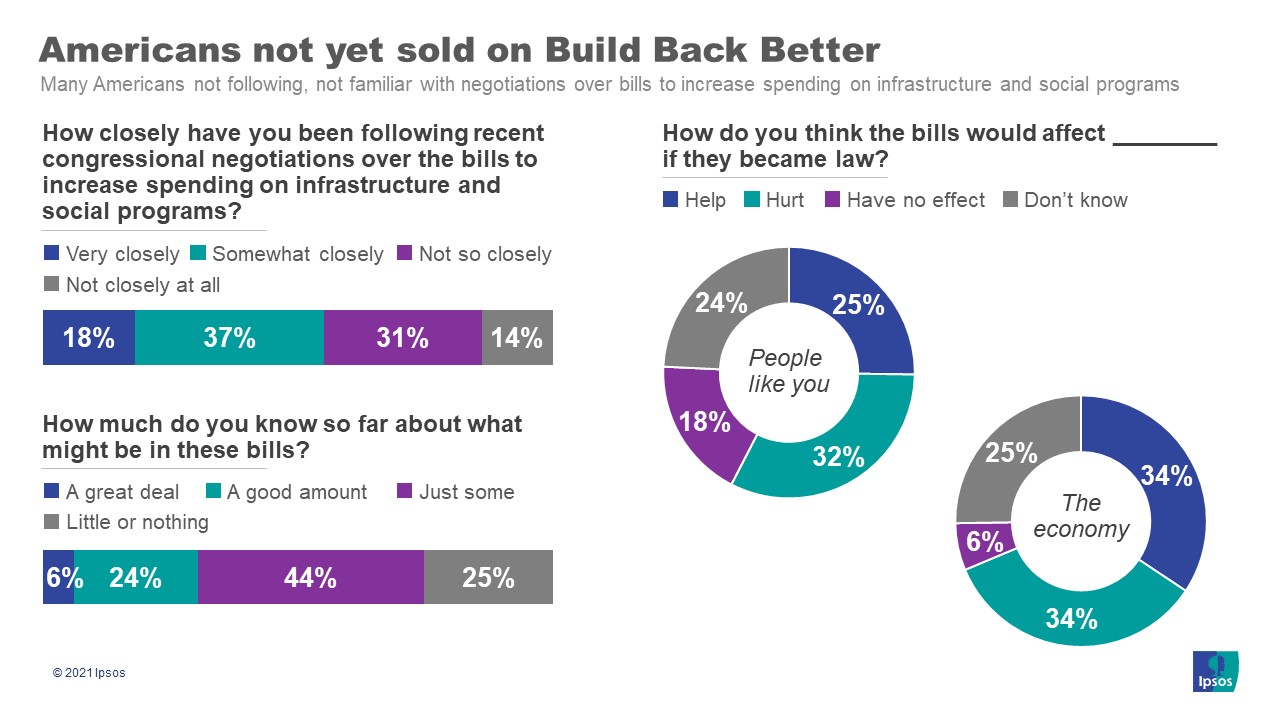Americans not yet sold on Build Back Better
Washington, DC, October 31, 2021
A new ABC News-Ipsos poll finds that broad swaths of the Americans public are not following, nor are they familiar with congressional negotiations over bills to increase spending on infrastructure and social programs. This comes days after the Biden administration announced on Thursday the framework for a pared down Build Back Better reconciliation bill and continued to push the administration’s infrastructure plan. The low level of public engagement illustrates the administration’s difficulty selling the plan to America, with this poll finding that Americans are split on the impact of these plans on the country and them personally.
President Biden’s standing with the American public continues to languish. His job approval ratings are underwater (more negative than positive) on issues ranging from the economic recovery, to immigration and the situation at the border, to taxes. Biden’s standing is approximately breaking even on climate change and infrastructure and he’s only clearly in positive territory with the response to the coronavirus.
 Detailed findings:
Detailed findings:
Americans are not closely following the developments of the administration’s social and infrastructure plans.
- Only about one in six (18%) Americans say they are following “news about the recent congressional negotiations over the bills to increase spending on infrastructure and social programs” very closely. An additional third (37%) say somewhat closely and almost half (45%) say they are not following these negotiations closely.
- Even fewer, 6%, say they know a great deal about what is in these spending plans with an additional quarter (24%) saying they know a good amount. The large majority of Americans, 69%, know just some, little, or nothing about the content of these plans.
Attitudes about the administration’s social and infrastructure plans appears to be most closely connected to partisanship.
- When asked how these plans would affect people like you, Americans are split with 25% saying it would help, 32% it would hurt, and 43% saying have no effect or don’t know. Below the total, partisanship has the strongest relationship to answers on this with Democrats mostly saying it would help (47%) and Republicans mostly saying it would hurt (64%).
- The same is true when asked about the impact on the U.S. economy. Americans break 34% help, 34% hurt, and 32% saying no effect or don’t know. Here too partisanship is the strongest predictor of sentiment with 68% of Democrats saying help and 61% of Republicans saying hurt.
President Biden’s standing with the American public remains weakened.
- Of the issues tested, Biden only receives clear majority approval on his handling of the response to the coronavirus (56% approve). However, this remains well below public support early in his administration (67% early February).
- Public sentiment on Biden’s handling of rebuilding U.S. infrastructure (52% approve) and climate change (48% approve) are split.
- On a wide range of other issues, less than half of the American public approve of Biden’s job performance including the economic recovery (47% approve), taxes (44% approve), crime (43% approve), gun violence (39% approve), Afghanistan (34% approve), or immigration and the situation at the U.S.-Mexico border (31% approve).
About the Study
This ABC News/Ipsos poll was conducted October 29 to October 30, 2021 by Ipsos using the probability-based KnowledgePanel®. This poll is based on a nationally representative probability sample of 514 adults age 18 or older.
The survey was conducted using KnowledgePanel, the largest and most well-established online probability-based panel that is representative of the adult US population. Our recruitment process employs a scientifically developed addressed-based sampling methodology using the latest Delivery Sequence File of the USPS – a database with full coverage of all delivery points in the US. Households invited to join the panel are randomly selected from all available households in the U.S. Persons in the sampled households are invited to join and participate in the panel. Those selected who do not already have internet access are provided a tablet and internet connection at no cost to the panel member. Those who join the panel and who are selected to participate in a survey are sent a unique password-protected log-in used to complete surveys online. As a result of our recruitment and sampling methodologies, samples from KnowledgePanel cover all households regardless of their phone or internet status and findings can be reported with a margin of sampling error and projected to the general population.
The study was conducted in both English and Spanish. The data were weighted to adjust for gender by age, race/ethnicity, education, Census region, metropolitan status, household income, and party identification. The demographic benchmarks came from 2019 American Community Survey (ACS) from the US Census Bureau. Party ID benchmarks are from recent ABC News/Washington Post telephone polls. The weighting categories were as follows:
• Gender (Male, Female) by Age (18–29, 30–44, 45–59, and 60+)
• Race/Hispanic Ethnicity (White Non-Hispanic, Black Non-Hispanic, Other or 2+ Races Non-Hispanic, Hispanic)
• Education (High School graduate or less, Some College, Bachelor and beyond)
• Census Region (Northeast, Midwest, South, West)
• Metropolitan status (Metro, non-Metro)
• Household Income (Under $25,000, $25,000-$49,999, $50,000-$74,999, $75,000-$99,999, $100,000-$149,999, $150,000+)
• Party ID (Democrat, Republican, Independent, Something else)
The margin of sampling error is plus or minus 4.7 percentage points at the 95% confidence level, for results based on the entire sample of adults. The margin of sampling error takes into account the design effect, which was 1.20. The margin of sampling error is higher and varies for results based on sub-samples. In our reporting of the findings, percentage points are rounded off to the nearest whole number. As a result, percentages in a given table column may total slightly higher or lower than 100%. In questions that permit multiple responses, columns may total substantially more than 100%, depending on the number of different responses offered by each respondent.
About Ipsos
Ipsos is the world’s third largest Insights and Analytics company, present in 90 markets and employing more than 18,000 people.
Our passionately curious research professionals, analysts and scientists have built unique multi-specialist capabilities that provide true understanding and powerful insights into the actions, opinions and motivations of citizens, consumers, patients, customers or employees. We serve more than 5000 clients across the world with 75 business solutions.
Founded in France in 1975, Ipsos is listed on the Euronext Paris since July 1st, 1999. The company is part of the SBF 120 and the Mid-60 index and is eligible for the Deferred Settlement Service (SRD).
ISIN code FR0000073298, Reuters ISOS.PA, Bloomberg IPS:FP www.ipsos.com



